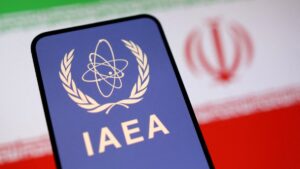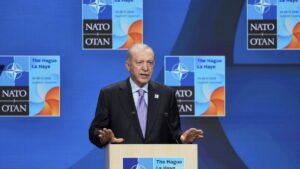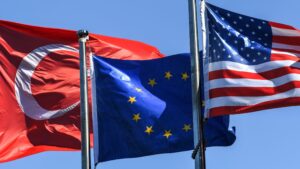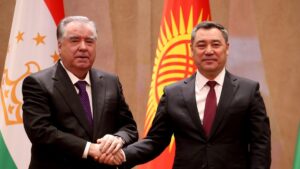Last month, when French President Emmanuel Macron announced that France would officially recognize a Palestinian state in September, a slight shift in tone within the Western media and political class toward Israel’s genocide in Gaza had already begun to take shape. The announcement was met with the usual suspects’ unmistakable contempt. For example, U.S. Secretary of State Marco Rubio described Macron’s decision as “reckless” and as serving “Hamas propaganda.” There was one person, however, who offered a plainer and much more helpful analysis: U.S. President Donald Trump, when asked for his comment on Macron’s “reckless decision” of minimally fulfilling France’s commitment to international law, stated the obvious that “what he says doesn’t matter.” In the same breath, Trump further dismissed Macron’s decision as not “carrying weight.”
Some might assume that Trump’s attitude is uniquely hegemonic, but history suggests otherwise. In a 1958 telegram from the U.S. Embassy in South Africa to the Department of State, the U.S. ambassador explained apartheid-era South African Foreign Minister Eric Louw’s rather surprising view as follows: “A specific and strong resolution against South Africa voted for by a majority of nations in the U.N. did not matter so much as this was to be expected. What mattered perhaps more than all other votes put together was that of the U.S., given its predominant position of leadership in the Western world.” In other words, the apartheid-era South African government understood very well that what the likes of Macron said “didn’t matter.” What mattered was only what the U.S. said.
The same holds in the case of British Prime Minister Keir Starmer’s similar announcement shortly after Macron’s, though with a few key differences. First, Starmer’s decision was apparently not as “reckless” because Britain’s recognition of a Palestinian state would be conditional. In this sense, Britain was more than willing to minimally fulfill its commitment to international law, albeit on the condition that Israel’s bloodlust was sufficiently satiated. In response, and this marks another difference, the U.S. government invited Britain to listen to reason and come to the understanding that recognizing a Palestinian state would be “rewarding Hamas,” the very opposite of the supposed goal of “punishing Hamas” by systematically destroying the people of Palestine.
It is abundantly clear that what others may think or say matters little where the American empire has already made a firm commitment. But what its own citizens think and say must surely matter greatly, or so one would think. Yet it is becoming increasingly evident that this, too, matters little. As a result, dissatisfaction with Trump’s servility to Israel and his government’s draconian domestic measures against “anti-Semitism” seems to have grown significantly even among those who might once have been considered the emperor’s “friends.” The realization that what they think or say matters so little, long known to those who cared to pay attention, but never before so grotesquely displayed, must be unsettling indeed. For the fact is that, ultimately, they share the same fate as Macron.
What is it, then, that actually matters when it comes to, say, a genocide? Who is it that makes the decisions in such matters? Everyone seems to have their own theory. Some are certainly better than others. A satisfactory theory must accommodate, for example, the fact that Irish President Michael Higgins, who recently urged U.N. Secretary General Antonio Guetterres to invoke Chapter 7 of the U.N. Charter about Israel’s conduct in Gaza, is not among the decision-makers of the world, at least not when the decision concerns the “Holy Land.”
Lacking knowledge of who the decision-makers are, it is challenging to discern their motives. Of course, we can guess. Yet no amount of guesswork will help us put better motives into action if the machinery of decision-making remains hidden, unaccountable and impervious to the voices of those who must live and die by its outcomes.




















































Be First to Comment